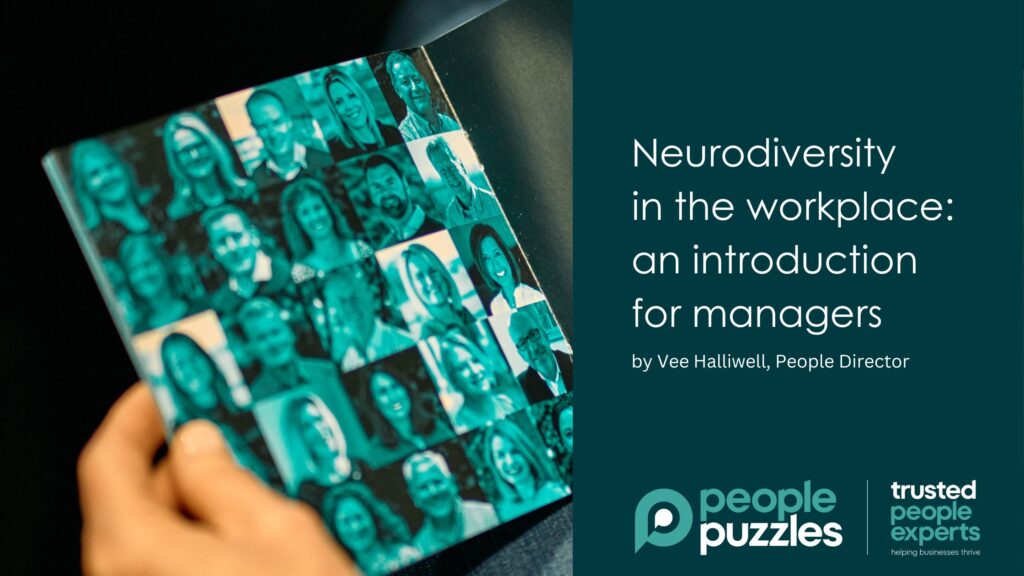Neurodiversity in the workplace: an introduction for managers
It is estimated that around one in five people in the UK today is neurodivergent. While definitions differ on exactly what neurodivergence means, the number of people living with some form of neurodivergence makes it an increasing priority for the modern workplace to understand better. To create truly inclusive and diverse workplaces, it is necessary for leaders to become more educated around this subject and incorporate ways to help a wider range of people to feel represented, seen and heard. People Director Vee Halliwell explains more.
What is Neurodiversity?
There are many definitions. In effect, some people’s brains work in ways which differ from what society perceives as “normal”. Examples of common neurodivergent types include dyslexia, dyspraxia, ADHD, autism, dyscalculia, dysgraphia and tourette’s but there are more. While it is estimated that 15-20% of the UK population are neurodiverse, the number could be much higher as not everyone has the opportunity for or wishes to be diagnosed.
Traits differ vastly from person to person and there is not one size that fits all. Common elements of working life can be challenging but these challenges can be overcome with the right adjustments and support. It’s also not uncommon for there to be unique traits that are more of a superpower than a challenge, for example the ability to hyper-focus; innovation / out of the box thinking; empathy; and high verbal abilities. This combination can mean that neurodiverse individuals may be experienced as having what is known as ‘spiky profiles’ with an extraordinarily high skill set in some areas but not others.
Neurodiversity at work
In recent times there has been more awareness of neurodiversity at work and the unique perspectives that a diverse workforce can bring, as well as simple adjustments that can be made to accommodate challenges from all areas from the recruitment process through to learning and development and career progression. Both Deloitte and EY have conducted in depth research into enablers for neurodivergent professionals providing useful online tools and reports.
The unique strengths that come with aspects of neurodiversity are, for some employers, the focus for specific hiring programmes. For example, GCHQ has specifically recruited neurodivergent individuals to access the unique thinking skills required for tasks like hacking and surveillance, while the World Economic Forum says that neurodivergent thinking may help humans to adapt to climate change and solve world problems differently. Microsoft has a specific autism hiring programme to support fostering creativity and innovation.
How can employers act to create more inclusive processes?
Whilst disclosure is a personal decision, education on the subject of neurodiversity, and all kinds of working with difference, through training, coaching and leadership development interventions can help build a foundation of healthy conversation and example setting. The CIPD recommends that all HR professionals make it their business to understand the benefits of neurodivergent professionals and at People Puzzles this is certainly something we have invested in.
Here is a quick list of inclusion initiatives and adjustments to consider – although one size does not fit all and it’s important to have open conversations as to what supports each individual:
- Reviewing recruitment processes. Look at how wide your net is cast; whether your application process is accessible, including verbal options, extra time or alternative means of testing; be aware of any discrimination which could be compounded by AI; provide interview questions in advance.
- Assessing the environment. This might include: assistive technology; flexible hours and remote working; dedicated desks and quiet spaces; lighting and temperature considerations; dress code requirements.
- Building the culture. This could involve: providing a mentor or coach; encouraging an internal buddy system; modelling acceptance from the top; framing policies to support neurodiversity; being open to new definitions of success or growth; awareness training provision; introducing neurodiversity into networks and communities.
Adjustments and enablers like these don’t necessarily need a formal diagnosis; providing flexible, accessible workspaces, culture and environment can be beneficial for all and can enhance your employer value proposition further.
Further guidance and support
Enlisting the support of an experienced HR professional to guide the process of policies, education and practice is always advisable and the business culture can benefit greatly from a strategic people expert within your senior team to guide this process.
A great deal of additional support is available to help businesses navigate this subject, and in the modern workplace support leaders to be equipped to work with it for the benefit of their business.
If you would like support or guidance in tackling the subject of neurodiversity in your business, we are here to help. You can call us (0345 646 5201), email us ([email protected]) or just fill out the contact form here on the website and we will be in touch.



